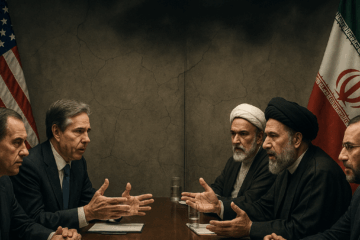As Americans weigh their vote for president in November’s election, the implications of a Kamala Harris presidency for nuclear deterrence and foreign policy warrant careful consideration. Harris, with seven years of foreign policy experience as a vice president and senator, promises both continuity and evolution in America’s approach to nuclear deterrence. Her leadership might balance the maintenance of a robust nuclear deterrent with advancing new priorities in national security and diplomacy, or it may not.
A Nuanced Continuity
Harris’ approach to nuclear deterrence will likely continue the multilateral strategy that characterizes the Biden administration. As vice president, she demonstrated a deep commitment to international alliances and a keen understanding of national security. This suggests that a Harris administration will maintain a strong nuclear deterrent as a cornerstone of national defense, while also advocating for arms control and nonproliferation efforts.
Additionally, a Harris administration will benefit from a seasoned foreign policy team. Her national security advisor, Phil Gordon, and his deputy, Rebecca Lissner, are experienced Washington hands who advocate for a balanced approach to American leadership. Their influence will likely steer Harris towards policies that emphasize deterrence without escalation and maintaining a credible nuclear arsenal while pursuing arms reductions.
Modernization with a Purpose
The Biden-Harris administration supports nuclear modernization as a component of national security. This includes updating existing systems and ensuring that the nuclear triad’s land-based missiles, submarine-launched ballistic missiles, and strategic bombers remain effective and secure. Modernization efforts are aimed at addressing the evolving threats posed by adversaries such as China and Russia, who are investing in advanced nuclear capabilities.
Additionally, during her tenure as a senator, Harris endorsed the importance of maintaining a credible nuclear deterrent to prevent adversaries from exploiting perceived weaknesses. Her support for modernization reflects a recognition that technological advancements and evolving geopolitical dynamics necessitate a reliable and secure nuclear arsenal. This perspective aligns with her broader commitment to national defense and security.
Generational Shift in Perspective
Kamala Harris represents a generational shift. Unlike her predecessors, she brings a globalized outlook shaped by her immigrant heritage and diverse experiences. This worldview is likely to influence her approach to nuclear policy, emphasizing the interconnectedness of global security. Harris has frequently spoken about the importance of addressing modern threats such as climate change and human rights, which she sees as intertwined with traditional security concerns. This broader perspective could lead to a more integrated approach to deterrence, considering a wider array of factors influencing global stability.
Engagement with Allies
Harris’s extensive engagement with international partners signals a strong commitment to collective security. Her active participation in high-profile international summits, such as the Munich Security Conference, Asia-Pacific Economic Cooperation (APEC), Association of Southeast Asian Nations (ASEAN) Summit, and the Conference of Paris (COP) climate summit in Dubai, underscores her belief in the power of alliances and multilateral cooperation. Harris has also demonstrated unwavering support for Ukraine in the face of Russian aggression, reflecting her dedication to upholding international norms and supporting allies under threat.
Under her leadership, the US is likely to continue strengthening NATO and other strategic partnerships—presenting a unified front against nuclear threats. Harris’ approach would emphasize the importance of solidarity among allies to ensure that deterrence strategies are robust and effective. Her support for multilateralism suggests she will work closely with allies to enhance deterrence capabilities, sharing intelligence and coordinating military strategies to address potential nuclear challenges.
Moreover, Harris’ experience on the Intelligence and Homeland Security Committees, combined with her background as a prosecutor, equips her with the skills to navigate complex security issues and engage in rigorous policy discussions. This expertise is instrumental in developing nuanced and comprehensive approaches to nuclear deterrence, ensuring that the US and its allies are well-prepared to counter any threats.
Strategic Restraint and Humanitarian Concerns
Harris’ stance on Israel and Gaza underscores her readiness to challenge established policies when humanitarian concerns are prominent. This approach reflects a broader principle that could significantly impact her handling of American nuclear deterrence. Harris’ sensitivity to the human costs of conflict suggests a preference for strategies that go beyond military force. Harris’ focus on humanitarian issues and her critical stance on the conduct of international conflicts indicate that she will prioritize the development of policies that not only ensure national security but also reflect ethical considerations.
Policy Evolution and Public Sentiment
Harris’ approach to nuclear deterrence will also reflect evolving public sentiment, particularly among younger Americans who prioritize issues like climate change and human rights. This demographic shift indicates a growing preference for a security strategy that integrates traditional defense measures with contemporary global challenges.
Her administration could leverage this support to advance comprehensive security policies that address both traditional and emerging threats. This means not only maintaining a credible nuclear deterrent to deter adversaries but also incorporating measures to combat climate change, promote human rights, and address cyber threats. By doing so, Harris can appeal to a new generation of Americans who demand a more holistic and forward-thinking approach to national and global security.
Conclusion
A Kamala Harris presidency may be positioned well to navigate the complexities of nuclear deterrence with a blend of strategic continuity and innovative evolution. Harris’ experience and commitment to multilateralism suggests a firm dedication to maintaining a credible and secure nuclear arsenal while actively pursuing arms control and nonproliferation efforts. Her support for nuclear modernization underscores the necessity of a reliable deterrent in the face of evolving global threats, reflecting a pragmatic approach to national security.
At the same time, Harris offers a generational shift in perspective and emphasis on global interconnectedness. Her focus on integrating humanitarian concerns, strategic restraint, and diplomatic engagement could lead to a more balanced and ethical approach to deterrence. This perspective aligns with her commitment to addressing contemporary global challenges, such as climate change and human rights.
Harris’ extensive international engagement and support for multilateral cooperation highlight her belief in the power of alliances to bolster deterrence and manage nuclear risks. Her administration will likely continue to strengthen NATO and other strategic partners—ensuring that American nuclear policy is both robust and cooperative.
As public sentiment evolves, particularly among younger generations who prioritize a holistic security strategy, Harris’ approach may resonate strongly with voters. By integrating traditional defense measures with contemporary priorities, her presidency may offer a nuanced and forward-thinking approach to nuclear deterrence, addressing both immediate security needs and long-term global stability.
Aaron Holland is a PhD candidate at the University of Utah and an analyst at the National Institute for Deterrence Studies. Views expressed are the author’s own.
About the Author

Aaron Holland
Aaron Holland is an Analyst at the National Institute for Deterrence Studies.





Harris should be great Adm. A war a week, nuks for Iran. What’s not 2 luv.
Does the term “cheese-eating, wine-swilling surrender monkey” encompass the totality of likely actions or not?
What a load of propagandistic hogwash. Harris will hand the U.S. to the NWO on a silver platter.